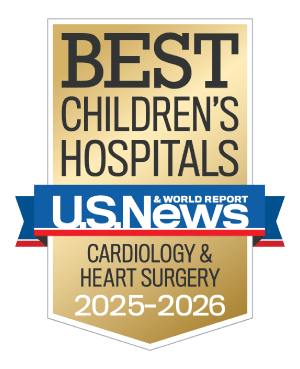Single Ventricle Interstage Clinic
The term "single ventricle anomaly" describes a group of heart problems that share the common feature of having only one properly functioning ventricle instead of two.
In a child with a single ventricle anomaly, the structures on either the left or right side of the heart are severely underdeveloped. The valves, which allow passage of blood through the heart, are either completely "atretic" (closed) or are very small on the impacted side. The ventricle itself is tiny, and the first part of the artery that delivers blood to the body or lungs is abnormally small, often only a few millimeters in diameter. This results in a situation where the baby may not be able to get enough blood to the body or lungs without intervention, which would eventually lead to death.
While outcomes have improved, single ventricle defects remain one of the most challenging congenital heart defects to manage. The “interstage” period between the first heart surgery and bidirectional Glenn operation (second heart surgery) remains a high-risk period for these infants. The mortality rate during this time period is estimated to be 10-15 percent.
About the Single Ventricle Interstage Clinic at the Heart Institute
To improve outcomes for infants during this extremely vulnerable time, the Heart Institute at Cincinnati Children’s has a dedicated Single Ventricle Interstage Clinic with the expressed mission to decrease morbidity and mortality during the interstage period. The clinic provides a standardized multidisciplinary approach to optimize clear communication and care coordination with all healthcare providers involved in the care of these babies.
Infants in the Single Ventricle Interstage Clinic are followed closely by specialists familiar with these very complex patients, including:
- Physicians
- Dietitians
- A nurse coordinator
- A speech therapist
- Psychologists from our Heart and Mind Wellbeing Center
Once home after the initial surgery, families are provided with equipment for home monitoring of their baby's weight and oxygen level to improve growth and nutritional outcomes.
Families and referring cardiologists also have access to a dedicated "single ventricle phone line" where our single ventricle nurse, who is familiar with each family and baby, can help troubleshoot problems, discuss clinical concerns, coordinate care, and discuss any challenges in transitioning care for the baby at home.
Types of conditions that are treated during the Single Ventricle Interstage Monitoring Program
Some of the anomalies described as single ventricle defects include:
- Tricuspid atresia
- Double inlet left ventricle (DILV)
- Many of the heterotaxy defects
- Some variations of double outlet right ventricle (DORV)
- Some of the surgeries these infants may have undergone include:
- Norwood operation
- Hybrid Stage 1 (Pulmonary artery banding/PDA stenting)
- Aortopulmonary shunt (BT shunt)
- Pulmonary artery banding
- Cardiac catheterization and intervention
Our Mission
- Provide high-quality, comprehensive care for single ventricle patients by utilizing a standardized approach for interstage monitoring
- Provide a dedicated Single Ventricle Clinic where all children are closely followed by a small group of physicians during the interstage period
- Improve growth and nutritional outcomes
- Educate parents regarding the care of their child
- Coordinate care among families, cardiologists, and pediatricians
- Decrease morbidity and mortality associated with the interstage period
Quality Improvement
We are part of the National Pediatric Cardiology Quality Improvement Collaborative (NPC-QIC) whose mission is to improve the care and outcome of infants with single ventricle defects during the interstage period.




